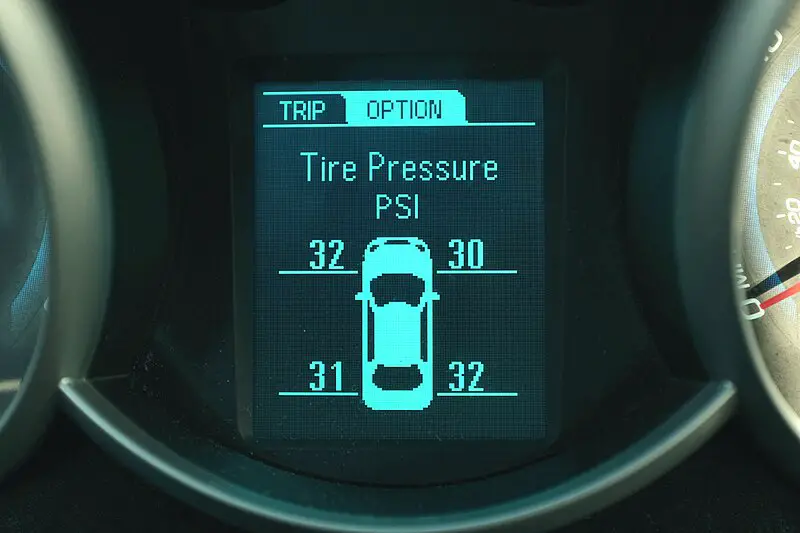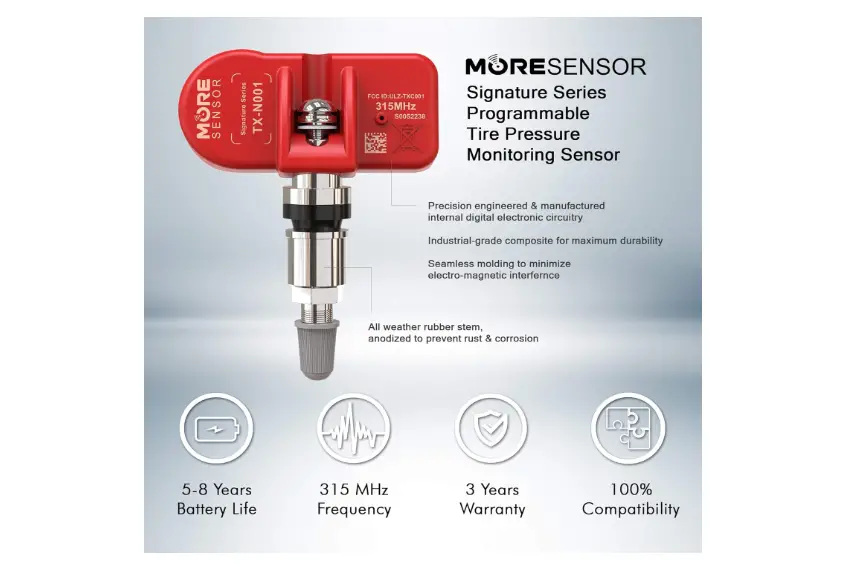Tire pressure sensors are usually covered by the manufacturer’s warranty if they fail due to defects, often within the first 3 years or 36,000 miles. However, damage from wear, tear, or accidents isn’t typically covered. Extended warranties may offer additional protection.
Tire pressure monitoring systems (TPMS) have become a crucial safety feature in modern vehicles. Introduced as a mandatory system in most countries following legislation aimed at reducing tire-related accidents, TPMS alerts drivers when their tires are under or over-inflated. The system is not only essential for vehicle safety but also for maintaining fuel efficiency and tire longevity. With their growing importance, many car owners often wonder if tire pressure sensors (a key component of the TPMS) are covered by warranty.
In this comprehensive blog post, we will explore the nature of warranties, the conditions under which TPMS sensors may be covered, and the different types of warranties that might apply.

Contents
Warranties: What is Covered?
Vehicle warranties vary significantly depending on the manufacturer, dealer, and even the country. To understand if your tire pressure sensors are covered, it’s important to look at the type of warranty you have:
- Manufacturer’s Warranty: Most new vehicles come with a manufacturer’s warranty that covers defects in materials or workmanship for a specific period, usually 3 years or 36,000 miles (whichever comes first). This warranty often covers TPMS sensors because they are considered part of the vehicle’s original equipment. However, coverage under this warranty depends on the specific terms and conditions outlined by the manufacturer.
- Extended Warranty: Extended warranties or service contracts may cover tire pressure sensors if they are part of the coverage plan. These warranties often kick in after the original manufacturer’s warranty expires and may provide more comprehensive coverage.
- Powertrain Warranty: A powertrain warranty typically covers the vehicle’s engine, transmission, and related components. TPMS sensors are unlikely to be covered under a powertrain warranty because they are not considered part of the powertrain system.
- Tire Warranty: Many tire manufacturers offer separate warranties on their tires, which may include coverage for defects in workmanship or materials. However, this type of warranty rarely covers TPMS sensors because they are not part of the tire itself.
When Are Tire Pressure Sensors Covered by Warranty?
There are certain circumstances under which tire pressure sensors might be covered under warranty:
1. Manufacturer Defects
If a tire pressure sensor fails due to a defect in manufacturing or materials, it will typically be covered by the manufacturer’s warranty. For example, if the sensor stops working within the warranty period without any external cause (like a collision or damage), it is usually replaced free of charge.
2. Premature Failure
If a TPMS sensor fails prematurely due to reasons other than regular wear and tear, the manufacturer’s warranty may cover it. However, if the sensor fails after the warranty period has expired, you would have to pay out of pocket unless you have an extended warranty.
3. Part of a Recall
If a manufacturer issues a recall on faulty TPMS sensors or the system in general, repairs or replacements are covered at no cost to the vehicle owner, regardless of warranty status.
4. Extended Warranties
Extended warranties vary in coverage. Some plans specifically include electronic components like TPMS sensors, while others may not. It’s essential to read the fine print of your extended warranty to see if tire pressure sensors are included.
5. Labor Costs
Even if the sensor is covered under warranty, there may be costs associated with labor, especially if the warranty doesn’t cover labor charges. Some warranties only cover the part itself, so it’s important to clarify what your specific warranty includes.

When TPMS Sensors Are Not Covered by Warranty
While warranties often cover sensor failure due to manufacturer defects, there are scenarios where they may not be covered:
1. Normal Wear and Tear
TPMS sensors are subject to wear and tear over time, just like any other part of the vehicle. Most sensors have a lifespan of about 5 to 10 years or 100,000 miles. The batteries inside TPMS sensors often wear out after 5–7 years, causing the sensor to fail. If the failure is due to age, most warranties will not cover it, as this is considered normal wear and tear.
2. Damage Caused by the Driver
If the sensor is damaged due to external factors, such as hitting a pothole, curb damage, or improper tire installation, the manufacturer or dealer may deny warranty claims. Physical damage from accidents or improper handling is not covered by most warranties.
3. Aftermarket Modifications
If you modify your vehicle with aftermarket wheels or tires, or if you install a non-original TPMS sensor, the warranty might not cover any related problems. Manufacturers often require the use of original equipment manufacturer (OEM) parts to maintain warranty coverage.
What to Do if the Tire Pressure Sensor Fails
If your TPMS sensor fails, here are some steps you should take to determine whether it’s covered by warranty:
- Check Your Warranty Documentation: Review the terms of your manufacturer’s warranty, extended warranty, or tire warranty to determine if the sensor is covered. Look for coverage related to electrical or electronic components.
- Visit the Dealer or Service Center: If you believe the sensor should be covered, visit your vehicle’s authorized dealership or service center. They will be able to inspect the sensor and determine if the issue is due to a manufacturing defect.
- Consider Extended Warranties: If your original warranty has expired, look into whether you have an extended warranty or whether it’s worth purchasing one. Extended warranties can provide peace of mind and cover costly repairs like TPMS sensor replacements.
- Get an Estimate for Repair: If the sensor isn’t covered under warranty, ask for an estimate before proceeding with repairs. TPMS sensor replacements can cost anywhere from $50 to $250 per sensor, depending on the vehicle and location.
Frequently Asked Questions
Here are some FAQs about tire pressure sensors and warranty –
1. How long do tire pressure sensors last?
Tire pressure sensors generally last 5 to 10 years or approximately 100,000 miles. Their lifespan is often limited by the battery inside, which cannot be replaced separately from the sensor itself.
2. Can I replace a TPMS sensor myself?
While it’s possible to replace a TPMS sensor yourself, it requires specific tools and the ability to reprogram the sensor to work with your vehicle’s system. It’s often better to have the replacement done by a professional to ensure proper installation.
3. Does insurance cover tire pressure sensor replacement?
Standard car insurance typically does not cover tire pressure sensor replacement unless it is part of a repair following an accident. However, extended warranties or specific service contracts may cover it.
4. What are the signs that my TPMS sensor is failing?
Signs of a failing TPMS sensor include a warning light that stays on even when tire pressure is correct, inconsistent or inaccurate readings, or no readings from a specific tire.
5. Is it safe to drive with a faulty TPMS sensor?
Driving with a faulty TPMS sensor can be dangerous because you won’t receive accurate information about your tire pressure. Under-inflated or over-inflated tires can lead to poor handling, reduced fuel efficiency, and an increased risk of accidents.
Conclusion
In summary, tire pressure sensors may be covered under your vehicle’s warranty, but it depends on the specific type of warranty and the nature of the issue. Manufacturer warranties typically cover defects in materials or workmanship for a limited period, while extended warranties may provide additional coverage. Wear and tear, damage caused by accidents, or aftermarket modifications usually void coverage. Therefore, understanding the warranty coverage and acting quickly if your TPMS sensor fails can save you from unnecessary expenses.